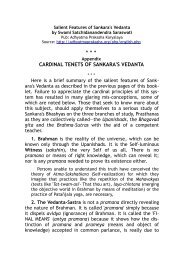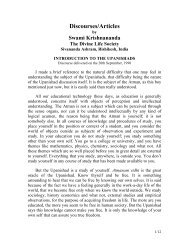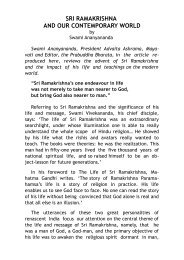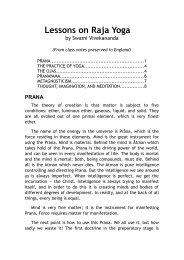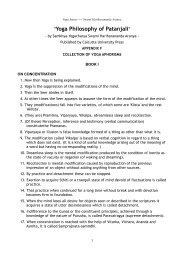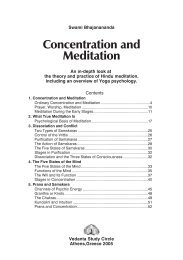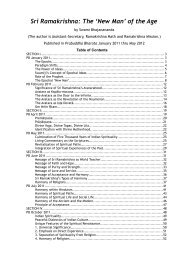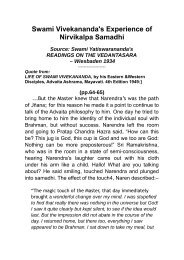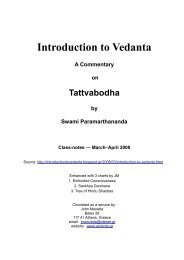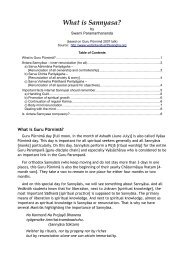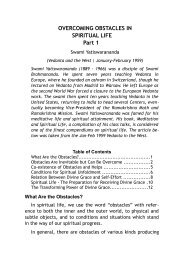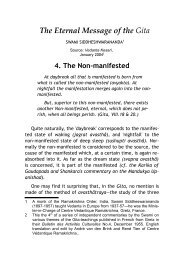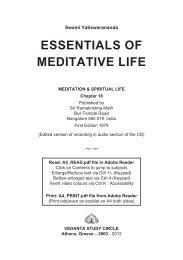Discourses on Jnana Yoga - Vedanta
Discourses on Jnana Yoga - Vedanta
Discourses on Jnana Yoga - Vedanta
You also want an ePaper? Increase the reach of your titles
YUMPU automatically turns print PDFs into web optimized ePapers that Google loves.
<str<strong>on</strong>g>Discourses</str<strong>on</strong>g> <strong>on</strong> Jñâna <strong>Yoga</strong> – Swami Vivekanandamanifestati<strong>on</strong> of God". It is our interpretati<strong>on</strong> of Brahman orthe Absolute, seen through the veil of Mâyâ or appearance.The world is not zero, it has a certain reality; it <strong>on</strong>ly appearsbecause Brahman is.How shall we know the knower? The <strong>Vedanta</strong> says, "We areIt, but can never know It, because It can never become theobject of knowledge." Modern science also says that It cannotbe known. We can, however, have glimpses of It from time totime. When the delusi<strong>on</strong> of this world is <strong>on</strong>ce broken, it willcome back to us, but no l<strong>on</strong>ger will it hold any reality for us.We shall know it as a mirage. To reach behind the mirage isthe aim of all religi<strong>on</strong>s. That man and God are <strong>on</strong>e is thec<strong>on</strong>stant teaching of the Vedas, but <strong>on</strong>ly few are able topenetrate behind the veil and reach the realisati<strong>on</strong> of thistruth.The first thing to be got rid of by him who would be aJñâni is fear. Fear is <strong>on</strong>e of our worst enemies. Next, believein nothing until you know it. C<strong>on</strong>stantly tell yourself, "I amnot the body, I am not the mind, I am not thought, I am noteven c<strong>on</strong>sciousness; I am the Atman." When you can throwaway all, <strong>on</strong>ly the true Self will remain. The Jñâni'smeditati<strong>on</strong> is of two sorts: (1) to deny and think awayeverything we are not; (2) to insist up<strong>on</strong> what we really are— the Atman, the One Self — Existence, Knowledge, andBliss. The true rati<strong>on</strong>alist must go <strong>on</strong> and fearlessly follow hisreas<strong>on</strong> to its farthest limits. It will not answer to stopanywhere <strong>on</strong> the road. When we begin to deny, all must gountil we reach what cannot be thrown away or denied, whichis the real "I". That "I" is the witness of the universe, it isunchangeable, eternal, infinite. Now, layer after layer ofignorance covers it from our eyes, but it remains ever thesame.2
<str<strong>on</strong>g>Discourses</str<strong>on</strong>g> <strong>on</strong> Jñâna <strong>Yoga</strong> – Swami VivekanandaTwo birds sat <strong>on</strong> <strong>on</strong>e tree. The bird at the top was calm,majestic, beautiful, perfect. The lower bird was alwayshopping from twig to twig, now eating sweet fruits and beinghappy, now eating bitter fruits and being miserable. Oneday, when he had eaten a fruit more bitter than usual, heglanced up at the calm majestic upper bird and thought,"How I would like to be like him!" and he hopped up a littleway towards him. So<strong>on</strong> he forgot all about his desire to belike the upper bird, and went <strong>on</strong> as before, eating sweet andbitter fruits and being happy and miserable. Again he lookedup, again he went up a little nearer to the calm and majesticupper bird. Many times was this repeated until at last hedrew very near the upper bird; the brilliancy of his plumagedazzled him, seemed to absorb him, and finally, to hisw<strong>on</strong>der and surprise, he found there was <strong>on</strong>ly <strong>on</strong>e bird — hewas the upper bird all the time and had but just found it out.Man is like that lower bird, but if he perseveres in his effortsto rise to the highest ideal he can c<strong>on</strong>ceive of, he too willfind that he was the Self all the time and the other was but adream. To separate ourselves utterly from matter and allbelief in its reality is true Jñâna. The Jñâni must keep ever inhis mind the "Om Tat Sat", that is, Om the <strong>on</strong>ly realexistence. Abstract unity is the foundati<strong>on</strong> of Jñâna-<strong>Yoga</strong>.This is called Advaitism ("without dualism or dvaitism"). Thisis the corner-st<strong>on</strong>e of the <strong>Vedanta</strong> philosophy, the Alpha andthe Omega. "Brahman al<strong>on</strong>e is true, all else is false and I amBrahman." Only by telling ourselves this until we make it apart of our very being, can we rise bey<strong>on</strong>d all duality, bey<strong>on</strong>dboth good and evil, pleasure and pain, joy and sorrow, andknow ourselves as the One, eternal, unchanging, infinite —the "One without a sec<strong>on</strong>d".The Jñâna-Yogi must be as intense as the narrowest3
<str<strong>on</strong>g>Discourses</str<strong>on</strong>g> <strong>on</strong> Jñâna <strong>Yoga</strong> – Swami Vivekanandasectarian, yet as broad as the heavens. He must absolutelyc<strong>on</strong>trol his mind, be able to be a Buddhist or a Christian, tohave the power to c<strong>on</strong>sciously divide himself into all thesedifferent ideas and yet hold fast to the eternal harm<strong>on</strong>y.C<strong>on</strong>stant drill al<strong>on</strong>e can enable us to get this c<strong>on</strong>trol. Allvariati<strong>on</strong>s are in the One, but we must learn not to identifyourselves with what we do, and to hear nothing, see nothing,talk of nothing but the thing in hand. We must put in ourwhole soul and be intense. Day and night tell yourself, "I amHe, I am He."The greatest teacher of the <strong>Vedanta</strong> philosophy wasShankarâchârya. By solid reas<strong>on</strong>ing he extracted from theVedas the truths of <strong>Vedanta</strong>, and <strong>on</strong> them built up thew<strong>on</strong>derful system of Jñâna that is taught in hiscommentaries. He unified all the c<strong>on</strong>flicting descripti<strong>on</strong>s ofBrahman and showed that there is <strong>on</strong>ly <strong>on</strong>e Infinite Reality.He showed too that as man can <strong>on</strong>ly travel slowly <strong>on</strong> theupward road, all the varied presentati<strong>on</strong>s are needed to suithis varying capacity. We find something akin to this in theteachings of Jesus, which he evidently adapted to thedifferent abilities of his hearers. First he taught them of aFather in heaven and to pray to Him. Next he rose a stephigher and told them, "I am the vine, you are the branches",and lastly he gave them the highest truth: "I and my Fatherare <strong>on</strong>e", and "The Kingdom of Heaven is within you."Shankara taught that three things were the great gifts ofGod: (1) human body, (2) thirst after God, and (3) a teacherwho can show us the light. When these three great gifts areours, we may know that our redempti<strong>on</strong> is at hand. Onlyknowledge can free and save us, but with knowledge must govirtue.4II
<str<strong>on</strong>g>Discourses</str<strong>on</strong>g> <strong>on</strong> Jñâna <strong>Yoga</strong> – Swami VivekanandaThe essence of <strong>Vedanta</strong> is that there is but <strong>on</strong>e Being andthat every soul is that Being in full, not a part of that Being.All the sun is reflected in each dew-drop. Appearing in time,space and causality, this Being is man, as we know him, butbehind all appearance is the <strong>on</strong>e Reality. Unselfishness is thedenial of the lower or apparent self. We have to freeourselves from this miserable dream that we are thesebodies. We must know the truth, "I am He". We are not dropsto fall into the ocean and be lost; each <strong>on</strong>e is the whole,infinite ocean, and will know it when released from thefetters of illusi<strong>on</strong>. Infinity cannot be divided, the "Onewithout a sec<strong>on</strong>d" can have no sec<strong>on</strong>d, all is that One. Thisknowledge will come to all, but we should struggle to attainit now, because until we have it, we cannot really givemankind the best help. The Jivanmukta ('the living free' or<strong>on</strong>e who knows) al<strong>on</strong>e is able to give real love, real charity,real truth, and it is truth al<strong>on</strong>e that makes us free. Desiremakes slaves of us, it is an insatiable tyrant and gives itsvictims no rest; but the Jivanmukta has c<strong>on</strong>quered all desireby rising to the knowledge that he is the One and there isnothing left to wish for.The mind brings before us all our delusi<strong>on</strong>s — body, sex,creed, caste, b<strong>on</strong>dage; so we have to tell the truth to themind incessantly, until it is made to realise it. Our realnature is all bliss, and all the pleasure we know is but areflecti<strong>on</strong>, an atom, of that bliss we get from touching ourreal nature. That is bey<strong>on</strong>d both pleasure and pain. It is the"witness" of the universe, the unchanging reader beforewhom turn the leaves of the book of life.Through practice comes <strong>Yoga</strong>, through <strong>Yoga</strong> comesknowledge, through knowledge love, and through love bliss.5
<str<strong>on</strong>g>Discourses</str<strong>on</strong>g> <strong>on</strong> Jñâna <strong>Yoga</strong> – Swami Vivekananda"Me and mine" is a superstiti<strong>on</strong>; we have lived in it so l<strong>on</strong>gthat it is well-nigh impossible to shake it off. Still we mustget rid of it if we would rise to the highest. We must bebright and cheerful, l<strong>on</strong>g faces do not make religi<strong>on</strong>. Religi<strong>on</strong>should be the most joyful thing in the world, because it is thebest. Asceticism cannot make us holy. Why should a man wholoves God and who is pure be sorrowful? He should be like ahappy child, be truly a child of God. The essential thing inreligi<strong>on</strong> is making the heart pure; the Kingdom of Heaven iswithin us, but <strong>on</strong>ly the pure in heart can see the King. Whilewe think of the world, it is <strong>on</strong>ly the world for us; but let uscome to it with the feeling that the world is God, and weshall have God. This should be our thought towards every<strong>on</strong>eand everything — parents, children, husbands, wives, friends,and enemies. Think how it would change the whole universefor us if we could c<strong>on</strong>sciously fill it with God! See nothing butGod! All sorrow, all struggle, all pain would be for ever lostto us!Jñâna is "creedlessness", but that does not mean that itdespises creeds. It <strong>on</strong>ly means that a stage above and bey<strong>on</strong>dcreeds has been gained. The Jñâni seeks not to destroy, butto help all. As all rivers roll their waters into the sea andbecome <strong>on</strong>e, so all creeds should lead to Jñâna and become<strong>on</strong>e.The reality of everything depends up<strong>on</strong> Brahman, and <strong>on</strong>lyas we really grasp this truth, have we any reality. When wecease to see any differences, then we know that "I and theFather are One".Jñâna is taught very clearly by Krishna in the Bhagavad-Gitâ. This great poem is held to be the Crown jewel of allIndian literature. It is a kind of commentary <strong>on</strong> the Vedas. It6
<str<strong>on</strong>g>Discourses</str<strong>on</strong>g> <strong>on</strong> Jñâna <strong>Yoga</strong> – Swami Vivekanandashows us that our battle for spirituality must be foughtout inthis life; so we must not flee from it, but rather compel it togive us all that it holds. As the Gita typifies this struggle forhigher things, it is highly poetical to lay the scene in abattlefield. Krishna in the guise of a charioteer to Arjuna,leader of <strong>on</strong>e of the opposing armies, urges him not to besorrowful, not to fear death, since he knows he is immortal,that nothing which changes can be in the real nature of man.Through chapter after chapter, Krishna teaches the highertruths of philosophy and religi<strong>on</strong> to Arjuna. It is theseteachings which make this poem so w<strong>on</strong>derful; practicallythe whole of the <strong>Vedanta</strong> philosophy is included in them. TheVedas teach that the soul is infinite and in no way affectedby the death of the body. The soul is a circle whosecircumference is nowhere, but whose centre is in some body.Death (so-called) is but a change of centre. God is a circlewhose circumference is nowhere and whose centre iseverywhere, and when we can get out of the narrow centreof body, we shall realise God — our true Self.The present is <strong>on</strong>ly a line of demarcati<strong>on</strong> between thepast and the future; so we cannot rati<strong>on</strong>ally say that we care<strong>on</strong>ly for the present, as it has no existence apart from thepast and the future. It is all <strong>on</strong>e complete whole, the idea oftime being merely a c<strong>on</strong>diti<strong>on</strong> imposed up<strong>on</strong> us by the formof our understanding.Jñâna teaches that the world should be given up, but not<strong>on</strong> that account to be aband<strong>on</strong>ed. To be in the world, but notof it, is the true test of the Sannyâsin. This idea ofrenunciati<strong>on</strong> has been in some form comm<strong>on</strong> to nearly allreligi<strong>on</strong>s. Jñâna demands that we look up<strong>on</strong> all alike, that weIII7
<str<strong>on</strong>g>Discourses</str<strong>on</strong>g> <strong>on</strong> Jñâna <strong>Yoga</strong> – Swami Vivekanandasee <strong>on</strong>ly "sameness". Praise and blame, good and bad, evenheat and cold, must be equally acceptable to us. In Indiathere are many holy men of whom this is literally true. Theywander <strong>on</strong> the snow-clad heights of the Himalayas or overthe burning desert sands, entirely unclothed and apparentlyentirely unc<strong>on</strong>scious of any difference in temperature.We have first of all to give up this superstiti<strong>on</strong> of body; weare not the body. Next must go the further superstiti<strong>on</strong> thatwe are mind. We are not mind; it is but the "silken body", notany part of the soul. The mere word "body", applied to nearlyall things, includes something comm<strong>on</strong> am<strong>on</strong>g all bodies. Thisis existence.Our bodies are symbols of thought behind, and thethoughts themselves are in their turn symbols of somethingbehind them, that is, the <strong>on</strong>e Real Existence, the Soul of oursoul, the Self of the universe, the Life of our life, our trueSelf. As l<strong>on</strong>g as we believe ourselves to be even the leastdifferent from God, fear remains with us; but when we knowourselves to be the One, fear goes: of what can we be afraid?By sheer force of will the Jñâni rises bey<strong>on</strong>d body, bey<strong>on</strong>dmind, making this universe zero. Thus he destroys Avidyâ [ignorance]and knows his true Self, the âtman. Happiness andmisery are <strong>on</strong>ly in the senses, they cannot touch our realSelf. The soul is bey<strong>on</strong>d time, space, and causality —therefore unlimited, omnipresent.The Jñâni has to come out of all forms, to get bey<strong>on</strong>d allrules and books, and be his own book. Bound by forms, wecrystallise and die. Still the Jñâni must never c<strong>on</strong>demn thosewho cannot yet rise above forms. He must never even thinkof another, "I am holier than thou".These are the marks of the true Jñâna-Yogi: (1) He desires8
<str<strong>on</strong>g>Discourses</str<strong>on</strong>g> <strong>on</strong> Jñâna <strong>Yoga</strong> – Swami Vivekanandanothing, save to know. (2) All his senses are under perfectrestraint; he suffers everything without murmuring, equallyc<strong>on</strong>tent if his bed be the bare ground under the open sky, orif he is lodged in a king's palace. He shuns no suffering, hestands and bears it-he has given up all but the Self. (3) Heknows that all but the One is unreal. (4) He has an intensedesire for freedom. With a str<strong>on</strong>g will, he fixes his mind <strong>on</strong>higher things and so attains to peace. If we know not peace,what are we more than the brutes? He does everything forothers — for the Lord — giving up all fruits of work andlooking for no result, either here or hereafter. What can theuniverse give us more than our own soul? Possessing that, wepossess all. The Vedas teach that the Atman, or Self, is theOne Undivided Existence. It is bey<strong>on</strong>d mind, memory,thought, or even c<strong>on</strong>sciousness as we know it. From it are allthings. It is that through which (or because of which) we see,hear, feel, and think. The goal of the universe is to realise<strong>on</strong>eness with the "Om" or One Existence. The Jñâni has to befree from all forms; he is neither a Hindu, a Buddhist, nor aChristian, but he is all three. All acti<strong>on</strong> is renounced, givenup to the Lord; then no acti<strong>on</strong> has power to bind. The Jñâniis a tremendous rati<strong>on</strong>alist; he denies everything. He tellshimself day and night, "There are no beliefs, no sacredwords, no heaven, no hell, no creed, no church — there is<strong>on</strong>ly Atman." When everything has been thrown away untilwhat cannot be thrown away is reached, that is the Self. TheJñâni takes nothing for granted; he analyses by pure reas<strong>on</strong>and force of will, until he reaches Nirvâna which is theextincti<strong>on</strong> of all relativity. No descripti<strong>on</strong> or even c<strong>on</strong>cepti<strong>on</strong>of this state is possible. Jñâna is never to be judged by anyearthly result. Be not like the vulture which soars almostbey<strong>on</strong>d sight, but which is ever ready to swoop downwards at9
<str<strong>on</strong>g>Discourses</str<strong>on</strong>g> <strong>on</strong> Jñâna <strong>Yoga</strong> – Swami Vivekanandathe sight of a bit of carri<strong>on</strong>. Ask not for healing, or l<strong>on</strong>gevity,or prosperity, ask <strong>on</strong>ly to be free.We are "Existence, Knowledge, Bliss" (Sachchidânanda).Existence is the last generalisati<strong>on</strong> in the universe; so weexist, we know it; and bliss is the natural result of existencewithout alloy. Now and then we know a moment of supremebliss, when we ask nothing, give nothing, and know nothingbut bliss. Then it passes and we again see the panorama ofthe universe going <strong>on</strong> before us and we know it is but a"mosaic work set up<strong>on</strong> God, who is the background of allthings". When we return to earth and see the Absolute asrelative, we see Sachchidânanda as Trinity — Father, S<strong>on</strong>,Holy Ghost. Sat = the creating principle; Chit = the guidingprinciple; ânanda = the realising principle, which joins usagain to the One. No <strong>on</strong>e can know "existence" (Sat) exceptthrough "knowledge" (Chit), and hence the force of the sayingof Jesus, No man can see the Father save through the S<strong>on</strong>.The <strong>Vedanta</strong> teaches that Nirvâna can be attained hereand now, that we do not have to wait for death to reach it.Nirvâna is the realisati<strong>on</strong> of the Self, and after having <strong>on</strong>ce,if <strong>on</strong>ly for an instant, known this, never again can <strong>on</strong>e bedeluded by the mirage of pers<strong>on</strong>ality. Having eyes, we mustsee the apparent; but all the time we know it for what it is,we have found out its true nature. It is the "screen" thathides the Self which is unchanging. The screen opens and wefind the Self behind it — all change is in the screen. In thesaint the screen is thin and the Reality can almost shinethrough; but in the sinner it is thick, and we are apt to losesight of the truth that the Atman is there, as well as behindthe saint.All reas<strong>on</strong>ing ends <strong>on</strong>ly in finding Unity; so we first use10
<str<strong>on</strong>g>Discourses</str<strong>on</strong>g> <strong>on</strong> Jñâna <strong>Yoga</strong> – Swami Vivekanandaanalysis, then synthesis. In the world of science, the forcesare gradually narrowed down in the search for <strong>on</strong>e underlyingforce. When physical science can perfectly grasp the finalunity, it will have reached an end, for reaching unity we findrest. Knowledge is final.Religi<strong>on</strong>, the most precious of all sciences, l<strong>on</strong>g agodiscovered that final unity, to reach which is the object ofJñâna-<strong>Yoga</strong>. There is but <strong>on</strong>e Self in the universe, of whichall lower selves are but manifestati<strong>on</strong>s. The Self, however, isinfinitely more than all of its manifestati<strong>on</strong>s. All is the Self orBrahman. The saint, the sinner, the lamb, the tiger, even themurderer, as far as they have any reality, can be nothingelse, because there is nothing else. "That which exists is One,sages call It variously." Nothing can be higher than thisknowledge, and in those purified by <strong>Yoga</strong> it comes in flashesto the soul. The more <strong>on</strong>e has been purified and prepared by<strong>Yoga</strong> and meditati<strong>on</strong>, the clearer are these flashes ofrealisati<strong>on</strong>. This was discovered 4,000 years ago, but has notyet become the property of the race; it is still the propertyof some individuals <strong>on</strong>ly.All men, so-called, are not yet really human beings. Every<strong>on</strong>e has to judge of this world through his own mind. Thehigher understanding is extremely difficult. The c<strong>on</strong>crete ismore to most people than the abstract. As an illustrati<strong>on</strong> ofthis, a story is told of two men in Bombay — <strong>on</strong>e a Hindu andthe other a Jain — who were playing chess in the house of arich merchant of Bombay. The house was near the sea, thegame l<strong>on</strong>g; the ebb and flow of the tide under the balc<strong>on</strong>ywhere they sat attracted the attenti<strong>on</strong> of the players. Oneexplained it by a legend that the gods in their play threw theIV11
<str<strong>on</strong>g>Discourses</str<strong>on</strong>g> <strong>on</strong> Jñâna <strong>Yoga</strong> – Swami Vivekanandawater into a great pit and then threw it out again. The othersaid: No, the gods draw it up to the top of a high mountain touse it, and then when they have d<strong>on</strong>e with it, they throw itdown again. A young student present began to laugh at themand said, "Do you not know that the attracti<strong>on</strong> of the mo<strong>on</strong>causes the tides?" At this, both men turned <strong>on</strong> him in a furyand inquired if he thought they were fools. Did he supposethat they believed the mo<strong>on</strong> had any ropes to pull up thetides, or that it could reach so far? They utterly refused toaccept any such foolish explanati<strong>on</strong>. At this juncture the hostentered the room and was appealed to by both parties. Hewas an educated man and of course knew the truth, butseeing plainly the impossibility of making the chess- playersunderstand it, he made a sign to the student and thenproceeded to give an explanati<strong>on</strong> of the tides that provedeminently satisfactory to his ignorant hearers. "You mustknow", he told them, "that afar off in the middle of theocean, there is a huge mountain of sp<strong>on</strong>ge — you have bothseen sp<strong>on</strong>ge, and know what I mean. This mountain of sp<strong>on</strong>geabsorbs a great deal of the water and then the sea falls; byand by the gods come down and dance <strong>on</strong> the mountain andtheir weight squeezes all the water out and the sea risesagain. This, gentlemen, is the cause of the tides, and you caneasily see for yourselves how reas<strong>on</strong>able and simple is thisexplanati<strong>on</strong>." The two men who ridiculed the power of themo<strong>on</strong> to cause the tides, found nothing incredible in amountain of sp<strong>on</strong>ge, danced up<strong>on</strong> by the gods! The gods werereal to them, and they had actually seen sp<strong>on</strong>ge; what wasmore likely than their joint effect up<strong>on</strong> the sea!"Comfort" is no test of truth; <strong>on</strong> the c<strong>on</strong>trary, truth isoften far from being "comfortable". If <strong>on</strong>e intends to reallyfind truth, <strong>on</strong>e must not cling to comfort. It is hard to let all12
<str<strong>on</strong>g>Discourses</str<strong>on</strong>g> <strong>on</strong> Jñâna <strong>Yoga</strong> – Swami Vivekanandago, but the Jñâni must do it. He must become pure, kill outall desires and cease to identify himself with the body. Thenand then <strong>on</strong>ly, the higher truth can shine in his soul. Sacrificeis necessary, and this immolati<strong>on</strong> of the lower self is theunderlying truth that has made sacrifice a part of allreligi<strong>on</strong>s. All the propitiatory offerings to the gods were butdimly understood types of the <strong>on</strong>ly sacrifice that is of anyreal value, the surrender of the apparent self, through whichal<strong>on</strong>e we can realise the higher Self, the âtman. The Jñânimust not try to preserve the body, nor even wish to do so. Hemust be str<strong>on</strong>g and follow truth, though the universe fall.Those who follow "fads" can never do this. It is a life-work,nay, the work of a hundred lives! Only the few dare to realisethe God within, to renounce heaven and Pers<strong>on</strong>al God and allhope of reward. A firm will is needed to do this; to be evenvacillating is a sign of tremendous weakness. Man always isperfect, or he never could become so; but he had to realiseit. If man were bound by external causes, he could <strong>on</strong>ly bemortal. Immortality can <strong>on</strong>ly be true of the unc<strong>on</strong>diti<strong>on</strong>ed.Nothing can act <strong>on</strong> the Atman — the idea is pure delusi<strong>on</strong>;but man must identify himself with that, not with body ormind. Let him know that he is the witness of the universe,then he can enjoy the beauty of the w<strong>on</strong>derful panoramapassing before him. Let him even tell himself, "I am theuniverse, I am Brahman." When man really identifies himselfwith the One, the Atman, everything is possible to him andall matter becomes his servant. As Shri Ramakrishna has said:After the butter is churned, it can be put in water or milkand will never mix with either; so when man has <strong>on</strong>cerealised the Self, he can no more be c<strong>on</strong>taminated by theworld. "From a ballo<strong>on</strong>, no minor distincti<strong>on</strong>s are visible, sowhen man rises high enough, he will not see good and evil13
<str<strong>on</strong>g>Discourses</str<strong>on</strong>g> <strong>on</strong> Jñâna <strong>Yoga</strong> – Swami Vivekanandapeople." "Once the pot is burned, no more can it be shaped;so with the mind that has <strong>on</strong>ce touched the Lord and has hada baptism of fire, no more can it be changed." Philosophy inSanskrit means "clear visi<strong>on</strong>", and religi<strong>on</strong> is practicalphilosophy. Mere theoretic, speculative philosophy is notmuch regarded in India. There is no church, no creed, nodogma. The two great divisi<strong>on</strong>s are the "Dvaitists" and the"Advaitists". The former say, "The way to salvati<strong>on</strong> is throughthe mercy of God; the law of causati<strong>on</strong>, <strong>on</strong>ce set in moti<strong>on</strong>,can never be broken; <strong>on</strong>ly God, who is not bound by this law,by His mercy helps us to break it". The latter say, "Behind allthis nature is something that is free; and finding that whichis bey<strong>on</strong>d all law gets us freedom; and freedom is salvati<strong>on</strong>."Dualism is <strong>on</strong>ly <strong>on</strong>e phase, Advaitism goes to the ultimate. Tobecome pure is the shortest path to freedom. Only that isours which we earn. No authority can save us, no beliefs. Ifthere is a God, all can find Him. No <strong>on</strong>e needsto be told it iswarm; each <strong>on</strong>e can discover it for himself. So it should bewith God. He should be a fact in the c<strong>on</strong>sciousness of allmen. The Hindus do not recognise "sin", as it is understood bythe Western mind. Evil deeds are not "sins", we are notoffending some Ruler in committing these; we are simplyinjuring ourselves, and we must suffer the penalty. It is not asin to put <strong>on</strong>e's finger in the fire, but he who does so willsurely suffer just as much as if it were. All deeds producecertain results, and "every deed returns to the doer"."Trinitarianism" is an advance <strong>on</strong> "Unitarianism" (which isdualism, God and man for ever separate). The first stepupwards is when we recognise ourselves as the children ofGod; the last step is when we realise ourselves as the One,the Atman.V14
<str<strong>on</strong>g>Discourses</str<strong>on</strong>g> <strong>on</strong> Jñâna <strong>Yoga</strong> – Swami VivekanandaThe questi<strong>on</strong> why there cannot be eternal bodies is initself illogical, as "body" is a term applied to a certaincombinati<strong>on</strong> of elements, changeable and in its very natureimpermanent. When we are not passing through changes, wewill not have bodies (so-called). "Matter" bey<strong>on</strong>d the limit oftime, space, and causality will not be matter at all. Time andspace exist <strong>on</strong>ly in us, we are the <strong>on</strong>e Permanent Being. Allforms are transitory, that is why all religi<strong>on</strong>s say, "God has noform". Menander was a Greco-Bactrian king. He wasc<strong>on</strong>verted to Buddhism about 150 B.C. by <strong>on</strong>e of the Buddhistmissi<strong>on</strong>ary m<strong>on</strong>ks and was called by them "Milinda". He askeda young m<strong>on</strong>k, his teacher, "Can a perfect man (such asBuddha) be in error or make mistakes?" The young m<strong>on</strong>k'sanswer was : The perfect man can remain in ignorance ofminor matters not in his experience, but he can never be inerror as to what his insight has actually realised. He isperfect here and now. He knows the whole mystery, theEssence of the universe, but he may not know the mereexternal variati<strong>on</strong> through which that Essence is manifestedin time and space. He knows the clay itself, but has not hadexperience of every shape it may be wrought into. Theperfect man knows the Soul itself, but not every form andcombinati<strong>on</strong> of its manifestati<strong>on</strong>. He would have to attainmore relative knowledge just as we do, though <strong>on</strong> account ofhis immense power, he would learn it far more quickly.The tremendous "search-light" of a perfectly c<strong>on</strong>trolledmind, when thrown <strong>on</strong> any subject, would rapidly reduce itto possessi<strong>on</strong>. It is very important to understand this,because it saves so much foolish explanati<strong>on</strong> as to how aBuddha or a Jesus could be mistaken in ordinary relativeKnowledge, as we well know they were. The disciples shouldnot be blamed as having put down the sayings err<strong>on</strong>eously. It15
<str<strong>on</strong>g>Discourses</str<strong>on</strong>g> <strong>on</strong> Jñâna <strong>Yoga</strong> – Swami Vivekanandais humbug to say that <strong>on</strong>e thing is true and another untrue intheir statements. Accept the whole account, or reject it.How can we pick out the true from the false?If a thing happens <strong>on</strong>ce, it can happen again. If any humanbeing has ever realised perfecti<strong>on</strong>, we too can do so. If wecannot become perfect here and now, we never can in anystate or heaven or c<strong>on</strong>diti<strong>on</strong> we may imagine. If Jesus Christwas not perfect, then the religi<strong>on</strong> bearing his name falls tothe ground. If he was perfect, then we too can becomeperfect. The perfect man does not reas<strong>on</strong> or "know", as wecount "knowing", for all our knowledge is mere comparis<strong>on</strong>,and there is no comparis<strong>on</strong>, no classificati<strong>on</strong>, possible in theAbsolute. Instinct is less liable to error than reas<strong>on</strong>, butreas<strong>on</strong> is higher and leads to intuiti<strong>on</strong>, which is higher still.Knowledge is the parent of intuiti<strong>on</strong>, which like instinct, isalso unerring, but <strong>on</strong> a higher plane. There are three gradesof manifestati<strong>on</strong> in living beings: (1) sub-c<strong>on</strong>scious —mechanical, unerring; (2) c<strong>on</strong>scious — knowing, erring; (3)superc<strong>on</strong>scious — intuiti<strong>on</strong>al, unerring; and these areillustrated in an animal, man, and God. For the man who hasbecome perfect, nothing remains but to apply hisunderstanding. He lives <strong>on</strong>ly to help the world, desiringnothing for himself. What distinguishes is negative — thepositive is ever wider and wider. What we have in comm<strong>on</strong> isthe widest of all, and that is "Being"."Law is a mental shorthand to explain a series ofphenomena"; but law as an entity, so to speak, does notexist. We use the word to express the regular successi<strong>on</strong> ofcertain occurrences in the phenomenal world. We must notlet law become a superstiti<strong>on</strong>, a something inevitable, towhich we must submit. Error must accompany reas<strong>on</strong>, butthe very struggle to c<strong>on</strong>quer error makes us gods. Disease is16
<str<strong>on</strong>g>Discourses</str<strong>on</strong>g> <strong>on</strong> Jñâna <strong>Yoga</strong> – Swami Vivekanandathe struggle of nature to cast out something wr<strong>on</strong>g; so sin isthe struggle of the divine in us to throw off the animal. Wemust "sin" (that is, make mistakes) in order to rise toGodhood.Do not pity any<strong>on</strong>e. Look up<strong>on</strong> all as your equal, cleanseyourself of the primal sin of inequality. We are all equal andmust not think, "I am good and you are bad, and I am tryingto reclaim you". Equality is the sign of the free. Jesus cameto publicans and sinners and lived with them. He never sethimself <strong>on</strong> a pedestal. Only sinners see sin. See not man, see<strong>on</strong>ly the Lord. We manufacture our own heaven and canmake a heaven even in hell. Sinners are <strong>on</strong>ly to be found inhell, and as l<strong>on</strong>g as we see them around us, we are thereourselves. Spirit is not in time, nor in space. Realise "I amExistence Absolute, Knowledge Absolute, Bliss Absolute — Iam He, I am He". Be glad at birth, be glad at death, rejoicealways in the love of God. Get rid of the b<strong>on</strong>dage of body;we have become slaves to it and learnt to hug our chains andlove our slavery; so much so that we l<strong>on</strong>g to perpetuate it,and go <strong>on</strong> with "body" "body" for ever. Do not cling to theidea of "body", do not look for a future existence in any waylike this <strong>on</strong>e; do not love or want the body, even of thosedear to us. This life is our teacher, and dying <strong>on</strong>ly makesroom to begin over again. Body is our schoolmaster, but tocommit suicide is folly, it is <strong>on</strong>ly killing the "schoolmaster".Another will take his place. So until we have learnt totranscend the body, we must have it, and losing <strong>on</strong>e, will getanother. Still we must not identify ourselves with the body,but look up<strong>on</strong> it <strong>on</strong>ly as an instrument to be used in reachingperfecti<strong>on</strong>. Hanumân, the devotee of Râma, summed up hisphilosophy in these words: When I identify myself with thebody, O Lord, I am Thy creature, eternally separate from17
<str<strong>on</strong>g>Discourses</str<strong>on</strong>g> <strong>on</strong> Jñâna <strong>Yoga</strong> – Swami VivekanandaThee. When I identify myself with the soul, I am a spark ofthat Divine Fire which Thou art. But when I identify myselfwith the Atman, I and Thou art <strong>on</strong>e.Therefore the Jñâni strives to realise the Self and nothingelse.Thought is all important, for "what we think we become".There was <strong>on</strong>ce a Sannyâsin, a holy man, who sat under atree and taught the people. He drank milk, and ate <strong>on</strong>lyfruit, and made endless "Prânâyâmas", and felt himself to bevery holy. In the same village lived an evil woman. Every daythe Sannyâsin went and warned her that her wickednesswould lead her to hell. The poor woman, unable to changeher method of life which was her <strong>on</strong>ly means of livelihood,was still much moved by the terrible future depicted by theSannyâsin. She wept and prayed to the Lord, begging Him toforgive her because she could not help herself. By and byboth the holy man and the evil woman died. The angels cameand bore her to heaven, while the dem<strong>on</strong>s claimed the soulof the Sannyâsin. "Why is this!" he exclaimed, "have I notlived a most holy life, and preached holiness to everybody?Why should I be taken to hell while this wicked woman istaken to heaven?" "Because," answered the dem<strong>on</strong>s, "whileshe was forced to commit unholy acts, her mind was alwaysfixed <strong>on</strong> the Lord and she sought deliverance, which has nowcome to her. But you, <strong>on</strong> the c<strong>on</strong>trary, while you performed<strong>on</strong>ly holy acts, had your mind always fixed <strong>on</strong> the wickednessof others. You saw <strong>on</strong>ly sin, and thought <strong>on</strong>ly of sin, so nowyou have to go to that place where <strong>on</strong>ly sin is." The moral ofthe story is obvious: The outer life avails little. The heartmust be pure and the pure heart sees <strong>on</strong>ly good, never evil.VI18
<str<strong>on</strong>g>Discourses</str<strong>on</strong>g> <strong>on</strong> Jñâna <strong>Yoga</strong> – Swami VivekanandaWe should never try to be guardians of mankind, or to stand<strong>on</strong> a pedestal as saints reforming sinners. Let us rather purifyourselves, and the result must be that in so doing we shallhelp others.Physics is bounded <strong>on</strong> both sides by metaphysics. So it iswith reas<strong>on</strong> — it starts from n<strong>on</strong>-reas<strong>on</strong> and ends with n<strong>on</strong>reas<strong>on</strong>.If we push inquiry far enough in the world ofpercepti<strong>on</strong>, we must reach a plane bey<strong>on</strong>d percepti<strong>on</strong>.Reas<strong>on</strong> is really stored up and classified percepti<strong>on</strong>,preserved by memory. We can never imagine or reas<strong>on</strong>bey<strong>on</strong>d our sense-percepti<strong>on</strong>s. Nothing bey<strong>on</strong>d reas<strong>on</strong> can bean object of sense-knowledge. We feel the limited characterof reas<strong>on</strong>, yet it does bring us to a plane where we get aglimpse of something bey<strong>on</strong>d. The questi<strong>on</strong> then arises: Hasman an instrument that transcends reas<strong>on</strong>? It is very probablethat in man there is a power to reach bey<strong>on</strong>d reas<strong>on</strong>; in factthe saints in all ages assert the existence of this power inthemselves. But it is impossible in the very nature of thingsto translate spiritual ideas and percepti<strong>on</strong>s into the languageof reas<strong>on</strong>; and these saints, each and all, have declared theirinability to make known their spiritual experiences. Languagecan, of course, supply no words for them, so that it can <strong>on</strong>lybe asserted that these are actual experiences and can be hadby all. Only in that way can they become known, but theycan never be described. Religi<strong>on</strong> is the science which learnsthe transcendental in nature through the transcendental inman. We know as yet but little of man, c<strong>on</strong>sequently butlittle of the universe. When we know more of man, we shallprobably know more of the universe. Man is the epitome ofall things and all knowledge is in him. Only for theinfinitesimal porti<strong>on</strong> of the universe, which comes into sensepercepti<strong>on</strong>,are we able to find a reas<strong>on</strong>; never can we give19
<str<strong>on</strong>g>Discourses</str<strong>on</strong>g> <strong>on</strong> Jñâna <strong>Yoga</strong> – Swami Vivekanandathe reas<strong>on</strong> for any fundamental principle. Giving a reas<strong>on</strong> fora thing is simply to classify it and put it in a pige<strong>on</strong>-hole ofthe mind. When we meet a new fact, we at <strong>on</strong>ce strive toput it in some existing category and the attempt to do this isto reas<strong>on</strong>. When we succeed in placing the fact, it gives acertain amount of satisfacti<strong>on</strong>, but we can never go bey<strong>on</strong>dthe physical plane in this classificati<strong>on</strong>. That man cantranscend the limits of the senses is the emphatic testim<strong>on</strong>yof all past ages. The Upanishads told 5,000 years ago that therealisati<strong>on</strong> of God could never be had through the senses. Sofar, modern agnosticism agrees, but the Vedas go furtherthan the negative side and assert in the plainest terms thatman can and does transcend this sense-bound, frozenuniverse. He can, as it were, find a hole in the ice, throughwhich he can pass and reach the whole ocean of life. Only byso transcending the world of sense, can he reach his true Selfand realise what he really is.Jñâna is never sense-knowledge. We cannot knowBrahman, but we are Brahman, the whole of It, not a piece.The unextended can never be divided. The apparent varietyis but the reflecti<strong>on</strong> seen in time and space, as we see thesun reflected in a milli<strong>on</strong> dewdrops, though we know that thesun itself is <strong>on</strong>e and not many. In Jñâna we have to lose sightof the variety and see <strong>on</strong>ly the Unity. Here there is nosubject, no object, no knowing, no thou or he or I, <strong>on</strong>ly the<strong>on</strong>e, absolute Unity. We are this all the time; <strong>on</strong>ce free, everfree. Man is not bound by the law of causati<strong>on</strong>. Pain andmisery are not in man, they are but as the passing cloudthrowing its shadow over the sun, but the cloud passes, thesun is unchanged; and so it is with man. He is not born, hedoes not die, he is not in time and space. These ideas aremere reflecti<strong>on</strong>s of the mind, but we mistake them for the20
<str<strong>on</strong>g>Discourses</str<strong>on</strong>g> <strong>on</strong> Jñâna <strong>Yoga</strong> – Swami Vivekanandareality and so lose sight of the glorious truth they obscure.Time is but the method of our thinking, but we are theeternally present tense. Good and evil have existence <strong>on</strong>ly inrelati<strong>on</strong> to us. One cannot be had without the other, becauseneither has meaning or existence apart from the other. Asl<strong>on</strong>g as we recognise duality, or separate God and man, sol<strong>on</strong>g we must see good and evil. Only by going to the centre,by unifying ourselves with God can we escape the delusi<strong>on</strong>sof the senses. When we let go the eternal fever of desire,the endless thirst that gives us no rest, when we have forever quenched desire, we shall escape both good and evil,because we shall have transcended both. The satisfacti<strong>on</strong> ofdesire <strong>on</strong>ly increases it, as oil poured <strong>on</strong> fire but makes itburn more fiercely. The further from the centre, the fastergoes the wheel, the less the rest. Draw near the centre,check desire, stamp it out, let the false self go, then ourvisi<strong>on</strong> will clear and we shall see God. Only throughrenunciati<strong>on</strong> of this life and of all life to come (heaven etc.),can we reach the point where we stand firmly <strong>on</strong> the trueSelf. While we hope for anything, desire still rules us. Be for<strong>on</strong>e moment really "hopeless", and the mist will clear. Forwhat to hope when <strong>on</strong>e is the all of existence? The secret ofJñâna is to give up all and be sufficient unto ourselves. Say"not", and you become "not"; say "is", and you become "is".Worship the Self within, naught else exists. All that binds usis Mâyâ-delusi<strong>on</strong>.The Self is the c<strong>on</strong>diti<strong>on</strong> of all in the universe, but It cannever be c<strong>on</strong>diti<strong>on</strong>ed. As so<strong>on</strong> as we know that we are It, weare free. As mortals we are not and never can be free. Freemortality is a c<strong>on</strong>tradicti<strong>on</strong> in terms, for mortality implieschange, and <strong>on</strong>ly the changeless can be free. The AtmanVII21
<str<strong>on</strong>g>Discourses</str<strong>on</strong>g> <strong>on</strong> Jñâna <strong>Yoga</strong> – Swami Vivekanandaal<strong>on</strong>e is free, and that is our real essence. We feel this innerfreedom; in spite of all theories, all beliefs, we know it, andevery acti<strong>on</strong> proves that we know it. The will is not free, itsapparent freedom is but a reflecti<strong>on</strong> from the Real. If theworld were <strong>on</strong>ly an endless chain of cause and effect, wherecould <strong>on</strong>e stand to help it? There must needs be a piece ofdry land for the rescuer to stand <strong>on</strong>, else how can he dragany<strong>on</strong>e out of the rushing stream and save him fromdrowning? Even the fanatic who cries "I am a worm", thinksthat he is <strong>on</strong> the way to become a saint. He sees the sainteven in the worm.There are two ends or aims of human life, real knowing(Vijñâna) and bliss. Without freedom, these two areimpossible. They are the touchst<strong>on</strong>e of all life. We shouldfeel the Eternal Unity so much, that we should weep for allsinners, knowing that it is we who are sinning. The eternallaw is self-sacrifice, not self-asserti<strong>on</strong>. What self to assertwhen all is <strong>on</strong>e? There are no "rights", all is love. The greattruths that Jesus taught have never been lived. Let us try hismethod and see if the world will not be saved. The c<strong>on</strong>trarymethod has nearly destroyed it. Selflessness <strong>on</strong>ly, notselfishness, can solve the questi<strong>on</strong>. The idea of "right" is alimitati<strong>on</strong>; there is really no "mine" and "thine", for I am thouand thou art I. We have "resp<strong>on</strong>sibility", not "rights". Weshould say, "I am the universe", not "I am John" or "I amMary". These limitati<strong>on</strong>s are all delusi<strong>on</strong>s and are what holdsus in b<strong>on</strong>dage, for as so<strong>on</strong> as I think, "I am John", I wantexclusive possessi<strong>on</strong> of certain things and begin to say "meand mine", and c<strong>on</strong>tinually make new distincti<strong>on</strong>s in so doing.So our b<strong>on</strong>dage goes <strong>on</strong> increasing with every freshdistincti<strong>on</strong>, and we get further and further away from thecentral Unity, the undivided Infinite. There is <strong>on</strong>ly <strong>on</strong>e22
<str<strong>on</strong>g>Discourses</str<strong>on</strong>g> <strong>on</strong> Jñâna <strong>Yoga</strong> – Swami VivekanandaIndividual, and each of us is That. Oneness al<strong>on</strong>e is love andfearlessness; separati<strong>on</strong> leads us to hatred and fear. Onenessfulfils the law. Here, <strong>on</strong> earth, we strive to enclose littlespaces and exclude outsiders, but we cannot do that in thesky, though that is what sectarian religi<strong>on</strong> tries to do when itsays, "Only this way leads to salvati<strong>on</strong>, all others are wr<strong>on</strong>g".Our aim should be to wipe out these little enclosures towiden the boundaries until they are lost sight of, and torealise that all religi<strong>on</strong>s lead to God. This little puny selfmust be sacrificed. This is the truth symbolised by baptisminto a new life, the death of the old man, the birth of thenew — the perishing of the false self, the realisati<strong>on</strong> of theAtman, the <strong>on</strong>e Self of the universe.The two great divisi<strong>on</strong>s of the Vedas are Karma Kânda —the porti<strong>on</strong> pertaining to doing or work, and Jñâna Kânda —the porti<strong>on</strong> treating of knowing, true knowledge. In theVedas we can find the whole process of the growth ofreligious ideas. This is because when a higher truth wasreached, the lower percepti<strong>on</strong> that led to it, was stillpreserved. This was d<strong>on</strong>e, because the sages realised thatthe world of creati<strong>on</strong> being eternal, there would always bethose who needed the first steps to knowledge, that thehighest philosophy, while open to all, could never be graspedby all. In nearly every other religi<strong>on</strong>, <strong>on</strong>ly the last or highestrealisati<strong>on</strong> of truth has been preserved, with the naturalc<strong>on</strong>sequence that the older ideas were lost, while the newer<strong>on</strong>es were <strong>on</strong>ly understood by the few and gradually came tohave no meaning for the many. We see this result illustratedin the growing revolt against old traditi<strong>on</strong>s and authorities.Instead of accepting them, the man of today boldlychallenges them to give reas<strong>on</strong>s for their claims, to makeclear the grounds up<strong>on</strong> which they demand acceptance. Much23
<str<strong>on</strong>g>Discourses</str<strong>on</strong>g> <strong>on</strong> Jñâna <strong>Yoga</strong> – Swami Vivekanandain Christianity is the mere applicati<strong>on</strong> of new names andmeanings to old pagan beliefs and customs. If the old sourceshad been preserved and the reas<strong>on</strong>s for the transiti<strong>on</strong>s fullyexplained, many things would have been clearer. The Vedaspreserved the old ideas and this fact necessitated hugecommentaries to explain them and why they were kept. Italso led to many superstiti<strong>on</strong>s, through clinging to old formsafter all sense of their meaning had been lost. In manycerem<strong>on</strong>ials, words are repeated which have survived from anow forgotten language and to which no real meaning cannow be attached. The idea of evoluti<strong>on</strong> was to be found inthe Vedas l<strong>on</strong>g before the Christian era; but until Darwin saidit was true, it was regarded as a mere Hindu superstiti<strong>on</strong>.All external forms of prayer and worship are included inthe Karma Kanda. These are good when performed in a spiritof unselfishness and not allowed to degenerate into mereformality. They purify the heart. The Karma-Yogi wantsevery<strong>on</strong>e to be saved before himself. His <strong>on</strong>ly salvati<strong>on</strong> is tohelp others to salvati<strong>on</strong>. "To serve Krishna's servants is thehighest worship." One great saint prayed, "Let me go to hellwith the sins of the whole world, but let the world be saved."This true worship leads to intense self-sacrifice. It is told of<strong>on</strong>e sage that he was willing togive all his virtues to his dog,that it might go to heaven, because it had l<strong>on</strong>g been faithfulto him, while he himself was c<strong>on</strong>tent to go to hell.The Jñâna Kânda teaches that knowledge al<strong>on</strong>e can save,in other words, that he must become "wise unto salvati<strong>on</strong>".Knowledge is first objective, the Knower knowing Himself.The Self, the <strong>on</strong>ly subject, is in manifestati<strong>on</strong> seeking <strong>on</strong>ly toknow Itself. The better the mirror, the better reflecti<strong>on</strong> itcan give; so man is the best mirror, and the purer the man,the more clearly he can reflect God. Man makes the mistake24
<str<strong>on</strong>g>Discourses</str<strong>on</strong>g> <strong>on</strong> Jñâna <strong>Yoga</strong> – Swami Vivekanandaof separating himself from God and identifying himself withthe body. This mistake arises through Mâyâ, which is notexactly delusi<strong>on</strong> but might be said to be seeing the real assomething else and not as it is. This identifying of ourselveswith the body leads to inequality, which inevitably leads tostruggle and jealousy, and so l<strong>on</strong>g as we see inequality, wecan never know happiness. "Ignorance and inequality are thetwo sources of all misery", says Jñâna.When man has been sufficiently buffeted by the world, heawakes to a desire for freedom; and searching for means ofescape from the dreary round of earthly existence, he seeksknowledge, learns what he really is, and is free. After thathe looks at the world as a huge machine, but takes good careto keep his fingers out of the wheels. Duty ceases for himwho is free; what power can c<strong>on</strong>strain the free being? Hedoes good, because it is his nature, not because any fanciedduty commands it. This does not apply to those who are stillin the b<strong>on</strong>dage of the senses. Only for him, who hastranscended the lower self, is this freedom. He stands <strong>on</strong> hisown soul, obeys no law; he is free and perfect. He hasund<strong>on</strong>e the old superstiti<strong>on</strong>s and got out of the wheel.Nature is but the mirror of our own selves. There is a limit tothe working power of human beings, but no limit to desire; sowe strive to get hold of the working powers of others andenjoy the fruits of their labours, escaping work ourselves.Inventing machinery to work for us can never increase wellbeing,for in gratifying desire, we <strong>on</strong>ly find it, and then wewant more and more without end. Dying, still filled withungratified desires, we have to be born again and again inthe vain search for satisfacti<strong>on</strong>. "Eight Milli<strong>on</strong>s of bodies havewe had, before we reached the human", say the Hindus.Jñâna says, "Kill desire and so get rid of it". That is the <strong>on</strong>ly25
<str<strong>on</strong>g>Discourses</str<strong>on</strong>g> <strong>on</strong> Jñâna <strong>Yoga</strong> – Swami Vivekanandaway. Cast out all causati<strong>on</strong> and realise the Atman. Onlyfreedom can produce true morality. If there were <strong>on</strong>ly anendless chain of cause and effect, Nirvâna could not be. It isextincti<strong>on</strong> of the seeming self, bound by this chain. That iswhat c<strong>on</strong>stitutes freedom, to get bey<strong>on</strong>d causality.Our true nature is good, it is free, the pure being that cannever be or do wr<strong>on</strong>g. When we read God with our eyes andminds, we call Him this or that; but in reality there is butOne, all variati<strong>on</strong>s are our interpretati<strong>on</strong>s of that One. Webecome nothing; we regain our true Self. Buddha's summaryof misery as the outcome of "ignorance and caste"(inequality) has been adopted by the Vedantists, because it isthe best ever made. It manifests the w<strong>on</strong>derful insight of thisgreatest am<strong>on</strong>g men. Let us then be brave and sincere:whatever path we follow with devoti<strong>on</strong>, must take us tofreedom. Once lay hold of <strong>on</strong>e link of the chain and thewhole must come after it by degrees. Water the root of thetree and the whole tree is watered. It is of little advantageto waste time to water each leaf. In other words, seek theLord and getting Him we get all. Churches, doctrines, forms— these are merely the hedges to protect the tender plant ofreligi<strong>on</strong>; but later <strong>on</strong> they must all be broken down, that thelittle plant may become a tree. So the various religious sects,Bibles, Vedas, and scriptures are just "tubs" for the littleplant; but it has to get out of the tub and fill the world.We must learn to feel ourselves as much in the sun, in thestars, as here. Spirit is bey<strong>on</strong>d all time and space; every eyeseeing is my eye; every mouth praising the Lord is my mouth;every sinner is I. We are c<strong>on</strong>fined nowhere, we are not body.The universe is our body. We are just the pure crystalreflecting all, but itself ever the same. We are magicianswaving magic wands and creating scenes before us at will,26
<str<strong>on</strong>g>Discourses</str<strong>on</strong>g> <strong>on</strong> Jñâna <strong>Yoga</strong> – Swami Vivekanandabut we have to go behind appearances and know the Self.This world is like water in a kettle, beginning to boil; first abubble comes, then another, then many until all is inebulliti<strong>on</strong> and passes away in steam. The great teachers arelike the bubbles as they begin — here <strong>on</strong>e, there <strong>on</strong>e; but inthe end every creature has to be a bubble and escape.Creati<strong>on</strong>, ever new, will bring new water and go through theprocess all over again. Buddha and Christ are the twogreatest "bubbles" the world has known. They were greatsouls who having realised freedom helped others to escape.Neither was perfect, but they are to be judged by theirvirtues, never by their defects. Jesus fell short, because hedid not always live up to his own highest ideal; and above all,because he did not give woman an equal place with man.Woman did everything for him, yet not <strong>on</strong>e was made anapostle. This was doubtless owing to his Semitic origin. Thegreat Aryans, Buddha am<strong>on</strong>g the rest, have always putwoman in an equal positi<strong>on</strong> with man. For them sex inreligi<strong>on</strong> did not exist. In the Vedas and Upanishads, womentaught the highest truths and received the same venerati<strong>on</strong>as men.VIIIBoth happiness and misery are chains, the <strong>on</strong>e golden, theother ir<strong>on</strong>; but both are equally str<strong>on</strong>g to bind us and hold usback from realising our true nature. The Atman knowsneither happiness nor misery. These are mere "states", andstates must ever change. The nature of the soul is bliss andpeace unchanging. We have not to get it; we have it; let uswash away the dross from our eyes and see it. We must standever <strong>on</strong> the Self and look with perfect calmness up<strong>on</strong> all the27
<str<strong>on</strong>g>Discourses</str<strong>on</strong>g> <strong>on</strong> Jñâna <strong>Yoga</strong> – Swami Vivekanandapanorama of the world. It is but baby's play and ought neverto disturb us. If the mind is pleased by praise, it will bepained by blame. All pleasures of the senses or even of themind are evanescent, but within ourselves is the <strong>on</strong>e trueunrelated pleasure, dependent <strong>on</strong> nothing outside. "Thepleasure of the Self is what the world calls religi<strong>on</strong>." Themore our bliss is within, the more spiritual we are. Let us notdepend up<strong>on</strong> the world for pleasure.Some poor fishwives, overtaken by a violent storm, foundrefuge in the garden of a rich man. He received them kindly,fed them, and left them to rest in a summer-house,surrounded by exquisite flowers which filled all the air withtheir rich perfume. The women lay down in this sweetsmellingparadise, but could not sleep. They missedsomething out of their lives and could not be happy withoutit. At last <strong>on</strong>e of the women arose and went to the placewhere they had left their fish baskets, brought them to thesummer-house, and then <strong>on</strong>ce more happy in the familiarsmell, they were all so<strong>on</strong> sound asleep.Let not the world be our "fish basket" which we have todepend up<strong>on</strong> for enjoyment. This is Tâmasika, or beingbound by the lowest of the three qualities (or Gunas). Nexthigher come the egotistical who talk always about "I", "I".Sometimes they do good work and may become spiritual.These are Râjasika or active. Highest come the introspectivenature (Sâttvika), those who live <strong>on</strong>ly in the Self. These threequalities are in every human being in varying proporti<strong>on</strong>s,and different <strong>on</strong>es predominate at different times. We muststrive to overcome Tamas with Rajas and then to submergeboth in Sattva.Creati<strong>on</strong> is not a "making" of something, it is the struggle28
<str<strong>on</strong>g>Discourses</str<strong>on</strong>g> <strong>on</strong> Jñâna <strong>Yoga</strong> – Swami Vivekanandato regain equilibrium, as when atoms of cork are thrown tothe bottom of a pail of water: they rush to the top singly andin clusters, and when all have reached the top andequilibrium has been regained, all moti<strong>on</strong> or "life" ceases. Sowith creati<strong>on</strong>; if equilibrium were reached, all change wouldcease and life, so-called, would end. Life must beaccompanied with evil, for when the balance is regained, theworld must end, as sameness and destructi<strong>on</strong> are <strong>on</strong>e. Thereis no possibility of ever having pleasure without pain, or goodwithout evil, for living itself is just the lost equilibrium. Whatwe want is freedom, not life, nor pleasure, nor good.Creati<strong>on</strong> is eternal, without beginning, without end, the evermoving ripple in an infinite lake. There are yet unreacheddepths and others where stillness has been regained, but theripple is ever progressing, the struggle to regain the balanceis eternal. Life and death are but different names for thesame fact, they are the two sides of <strong>on</strong>e coin. Both are Mâyâ,the inexplicable state of striving at <strong>on</strong>e point to live and amoment later to die. Bey<strong>on</strong>d all this is the true nature, theAtman. We enter into creati<strong>on</strong>, and then, for us, it becomesliving. Things are dead in themselves, <strong>on</strong>ly we give them life,and then, like fools, we turn round and are afraid of them orenjoy them! The world is neither true nor untrue, it is theshadow of truth."Imaginati<strong>on</strong> is the gilded shadow of truth", says the poet.The internal universe, the Real, is infinitely greater than theexternal <strong>on</strong>e, which is but the shadowy projecti<strong>on</strong> of the true<strong>on</strong>e. When we see the "rope", we do not see the "serpent",and when the "serpent" is, the "rope" is not. Both cannot existat the same time; so while we see the world we do notrealise the Self, it is <strong>on</strong>ly an intellectual c<strong>on</strong>cept. In therealisati<strong>on</strong> of Brahman, the pers<strong>on</strong>al "I" and all sense of the29
<str<strong>on</strong>g>Discourses</str<strong>on</strong>g> <strong>on</strong> Jñâna <strong>Yoga</strong> – Swami Vivekanandaworld is lost. The Light does not know the darkness, becauseit has no existence in the light; so Brahman is all. While werecognise a God, it is really <strong>on</strong>ly the Self that we haveseparated from ourselves and worship as outside of us; butall the time it is our own true Self, the <strong>on</strong>e and <strong>on</strong>ly God.The nature of the brute is to remain where he is, of man toseek good and avoid evil, of God to neither seek nor avoid,but just to be blissful eternally. Let us be Gods, let us makeour hearts like an ocean, to go bey<strong>on</strong>d all the trifles of theworld and see it <strong>on</strong>ly as a picture. We can then enjoy itwithout being in any way affected by it. Why look for good inthe world, what can we find there? The best it has to offer is<strong>on</strong>ly as if children playing in a mud puddle found a few glassbeads. They lose them again and have to begin the searchanew. Infinite strength is religi<strong>on</strong> and God. We are <strong>on</strong>ly soulsif we are free, there is immortality <strong>on</strong>ly if we are free, thereis God <strong>on</strong>ly if He is free.Until we give up the world manufactured by the ego,never can we enter the Kingdom of Heaven. N<strong>on</strong>e ever did,n<strong>on</strong>e ever will. To give up the world is to utterly forget theego, to know it not at all, living in the body but not beingruled by it. This rascal ego must be obliterated. Power tohelp mankind is with the silent <strong>on</strong>es who <strong>on</strong>ly live and loveand withdraw their own pers<strong>on</strong>ality entirely. They never say"me" or "mine", they are <strong>on</strong>ly blessed in being theinstruments to help others. They are wholly identified withGod, asking nothing and not c<strong>on</strong>sciously doing anything. Theyare the true Jivanmuktas — the absolutely selfless, theirlittle pers<strong>on</strong>ality thoroughly blown away, ambiti<strong>on</strong> n<strong>on</strong>existent.They are all principle, with no pers<strong>on</strong>ality. Themore we sink the "little self", the more God comes. Let usget rid of the little "I" and let <strong>on</strong>ly the great "I" live in us. Our30
<str<strong>on</strong>g>Discourses</str<strong>on</strong>g> <strong>on</strong> Jñâna <strong>Yoga</strong> – Swami Vivekanandabest work and our greatest influence is when we are withouta thought of self. It is the "desireless" who bring great resultsto pass. Bless men when they revile you. Think how muchgood they are doing by helping to stamp out the false ego.Hold fast to the real Self, think <strong>on</strong>ly pure thoughts, and youwill accomplish more than a regiment of mere preachers. Outof purity and silence comes the word of power.Expressi<strong>on</strong> is necessarily degenerati<strong>on</strong>, because spirit can<strong>on</strong>ly be expressed by the "letter", and as St. Paul said, "theletter killeth". Life cannot be in the "letter" which is <strong>on</strong>ly areflecti<strong>on</strong>. Yet, principle must be clothed in matter to be"known". We lose sight of the Real in the covering and cometo c<strong>on</strong>sider that as the Real, instead of as the symbol. This isan almost universal mistake. Every great Teacher knows thisand tries to guard against it; but humanity, in general, ispr<strong>on</strong>e to worship the seen rather than the unseen. This iswhy a successi<strong>on</strong> of prophets have come to the world topoint again and again to the principle behind the pers<strong>on</strong>alityand to give it a new covering suited to the times. Truthremains ever unchanged, but it can <strong>on</strong>ly be presented in a"form"; so from time to time a new "form" or expressi<strong>on</strong> isgiven to Truth, as the progress of mankind makes them readyto receive it. When we free ourselves from name and form,especially when we no l<strong>on</strong>ger need a body of any kind, goodor bad, coarse or fine, then <strong>on</strong>ly do we escape from b<strong>on</strong>dage."Eternal progressi<strong>on</strong>" would be eternal b<strong>on</strong>dage. We must getbey<strong>on</strong>d all differentiati<strong>on</strong> and reach eternal "sameness" orhomogeneity or Brahman. The Atman is the unity of allpers<strong>on</strong>alities and is unchangeable, the "One without asec<strong>on</strong>d". It is not life, but it is coined into life. It is bey<strong>on</strong>dlife and death and good and bad. It is the Absolute Unity.IX31
<str<strong>on</strong>g>Discourses</str<strong>on</strong>g> <strong>on</strong> Jñâna <strong>Yoga</strong> – Swami VivekanandaDare to seek Truth even through hell. Freedom can never betrue of name and form, of the related. No form can say, "Iam free as a form." Not until all idea of form is lost, doesfreedom come. If our freedom hurts others, we are not freethere. We must not hurt others. While real percepti<strong>on</strong> is <strong>on</strong>ly<strong>on</strong>e, relative percepti<strong>on</strong>s must be many. The fountain of allknowledge is in every <strong>on</strong>e of us — in the ant as in the highestangel. Real religi<strong>on</strong> is <strong>on</strong>e; all quarrel is with the forms, thesymbols, the "illustrati<strong>on</strong>s". The millennium exists already forthose who find it. The truth is, we have lost ourselves andthink the world to be lost. "Fool! Hearest not thou? In thineown heart, day and night, is singing that Eternal Music —Sachchidânanda, Soham, Soham, (Existence, Knowledge, andBliss, I am He, I am He)!"To try to think without a phantasm is to try to make theimpossible possible. Each thought has two parts — thethinking and the word, and we must have both. Neitheridealists nor materialists are able to explain the world; to dothat, we must take both idea and expressi<strong>on</strong>. All knowledgeis of the reflected as we can <strong>on</strong>ly see our own faces reflectedin a mirror. So no <strong>on</strong>e can know his Self or Brahman; buteach is that Self and must see it reflected in order to make itan object of knowledge. This seeing the illustrati<strong>on</strong>s of theunseen Principle is what leads to idolatry — so-called. Therange of idols is wider than is usually supposed. They rangefrom wood and st<strong>on</strong>e to great pers<strong>on</strong>alities as Jesus orBuddha. The introducti<strong>on</strong> of idols into India was the result ofBuddha's c<strong>on</strong>stantly inveighing against a Pers<strong>on</strong>al God. TheVedas knew them not, but the reacti<strong>on</strong> against the loss ofGod as Creator and Friend led to making idols of the greatteachers, and Buddha himself became an idol and isworshipped as such by milli<strong>on</strong>s of people. Violent attempts at32
<str<strong>on</strong>g>Discourses</str<strong>on</strong>g> <strong>on</strong> Jñâna <strong>Yoga</strong> – Swami Vivekanandareform always end in retarding true reform. To worship isinherent in every man's nature; <strong>on</strong>ly the highest philosophycan rise to pure abstracti<strong>on</strong>. So man will ever pers<strong>on</strong>ify hisGod in order to worship Him. This is very good, as l<strong>on</strong>g as thesymbol, be it what it may, is worshipped as a symbol of theDivinity behind and not in and for itself. Above all, we needto free ourselves from the superstiti<strong>on</strong> of believing because"it is in the books". To try to make everything — science,religi<strong>on</strong>, philosophy, and all — c<strong>on</strong>form to what any booksays, is a most horrible tyranny. Book-worship is the worstform of idolatry. There was <strong>on</strong>ce a stag, proud and free, andhe talked in a lordly fashi<strong>on</strong> to his child, "Look at me, see mypowerful horns! With <strong>on</strong>e thrust I can kill a man; it is a finething to be a stag!" Just then the sound of the huntsman'sbugle was heard in the distance, and the stag precipitatelyfled, followed by his w<strong>on</strong>dering child. When they hadreached a place of safety, he inquired, "Why do you flybefore man, O my father, when you are so str<strong>on</strong>g and brave?"The stag answered, "My child, I know I am str<strong>on</strong>g andpowerful, but when I hear that sound, something seizes meand makes me fly whether I will or no." So with us. We hearthe "bugle sound" of the laws laid down in the books, habitsand old superstiti<strong>on</strong>s lay hold of us; and before we know it,we are fast bound and forget our real nature which isfreedom.Knowledge exists eternally. The man who discovers aspiritual truth is what we call "inspired", and what he bringsto the world is revelati<strong>on</strong>. But revelati<strong>on</strong> too is eternal and isnot to be crystallised as final and then blindly followed.Revelati<strong>on</strong> may come to any man who has fitted himself toreceive it. Perfect purity is the most essential thing, for <strong>on</strong>ly"the pure in heart shall see God". Man is the highest being33
<str<strong>on</strong>g>Discourses</str<strong>on</strong>g> <strong>on</strong> Jñâna <strong>Yoga</strong> – Swami Vivekanandathat exists and this is the greatest world, for here can manrealise freedom. The highest c<strong>on</strong>cept we can have of God isman. Every attribute we give Him bel<strong>on</strong>gs also to man, <strong>on</strong>lyin a lesser degree. When we rise higher and want to get outof this c<strong>on</strong>cept of God, we have to get out of the body, outof mind and imaginati<strong>on</strong>, and leave this world out of sight.When we rise to be the absolute, we are no l<strong>on</strong>ger in theworld — all is Subject, without object. Man is the apex of the<strong>on</strong>ly "world" we can ever know. Those who have attained"sameness" or perfecti<strong>on</strong>, are said to be "living in God". Allhatred is "killing the self by the self"; therefore, love is thelaw of life. To rise to this is to be perfect; but the more"perfect" we are, the less work can we do. The Sattvika seeand know that all this world is mere child's play and do nottrouble themselves about that. We are not much disturbedwhen we see two puppies fighting and biting each other. Weknow it is not a serious matter. The perfect <strong>on</strong>e knows thatthis world is Mâyâ. Life is called Samsâra — it is the result ofthe c<strong>on</strong>flicting forces acting up<strong>on</strong> us. Materialism says, "Thevoice of freedom is a delusi<strong>on</strong>." Idealism says, "The voice thattells of b<strong>on</strong>dage is but a dream." <strong>Vedanta</strong> says, "We are freeand not free at the same time." That means that we arenever free <strong>on</strong> the earthly plane, but ever free <strong>on</strong> thespiritual side. The Self is bey<strong>on</strong>d both freedom and b<strong>on</strong>dage.We are Brahman, we are immortal knowledge bey<strong>on</strong>d thesenses, we are Bliss Absolute.ghFor similar material and more informati<strong>on</strong>visit our website:www.vedanta.gr34



